DSS is experienced in the following areas
Conflict Mediation : On April 2016, DSS entered into an agreement with the Asia Foundation to work as a "Regional Dialogue Forum" at the district and regional level. As the political precariousness in Madhesh has become unpredictable, DSS began facilitating as a trusted forum for informal dialogue to resolve political standoffs, thaw stalemates and promote peaceful engagement on issues of federalism, demarcation of federal lines, identity politics, harmonizing relationships between different caste and ethnic groups. DSS has formed a regional committee comprising the political party representatives, renowned journalists and professors to facilitate dialogue on these contentious issues.
Gender Equity : DSS has facilitated to establish 'Women's Rights Forum' that primarily worked as a lobby and campaign group working to change the perceived notion and status quo of society. Similarly, women have participated in advocacy programs in issues of reproductive health, women's rights in ancestral property, issuing citizenship on mother's name, sit-in protest in VDC for drinking water, protests demanding electricity, equal wages through memorandum submission, processions and sit-in.
"75 cases of violence against women (VAW) were filed by DSS in 2009, which include cases of domestic violence, child marriage, witchcraft, property rights, divorce, rape, multiple marriage and dowry (2009, Action Aid)."
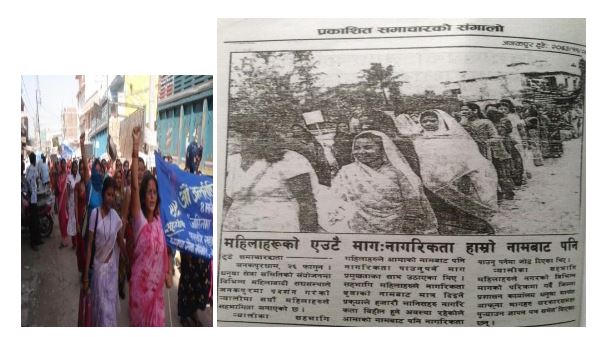 Apart of that DSS has also worked with women to raise their access to justice and security.
Apart of that DSS has also worked with women to raise their access to justice and security. In 2007, DSS with the help of Nepal Bar Association, Dhanusha and Action Aid Nepal organized several trainings on "law education".
The issues included, women's rights, provision on citizenship, child rights, rights related to land and ancestral property. In addition, it has directly worked with Nepal Police while implementing anti-trafficking project that was partnered with the ABC Nepal. DSS along with Nepal police has rescued Nepalese girl and women trafficked to nearby border of India and helped them settle back in society by engaging them in different trainings (sewing, hair cutting, small business skills).
Food Security : DSS has been working on food security since 2001. The activities include; organic farming, collective farming, wasteland management, community forest management, and watershed management, facilitate to establish land rights' forum, and agro-forestry. Through the land rights forum, DSS has campaigned demanding land for the landless people in the district. It organized hundreds of demonstration in the last ten years. DSS actively participated in the memorandum handing campaign to the Prime minister organized by the network of national organizations working in the land right issue.
Health : DSS has been providing health services since 2000 with a focus on reproductive health. DSS runs a community hospital of its own and provide services to girls, women, men and children of almost thirteen VDCs. A community hospital is based on DSS building and is located in Bengadawar, Dhanusha. So far, over 50,000 girls and women have been provided with reproductive health services.
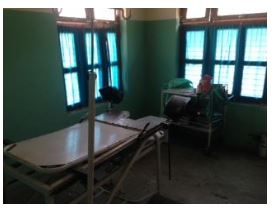
Livelihood/Income Generation : DSS has helped form various credit and savings groups as well cooperatives in the targeted communities. Women have been actively involved in generating funds through cooperatives and further utilizing them in economic activities. DSS has helped form 118 Saving & Credit groups and 3 cooperatives. Women have led most of these Saving & Credit groups and cooperatives. The Badhari Cooperative, which was established in 2006 by DSS, has more than NRS. 600,000,00 of annual turnover.
Education : "780 Dalit students out of which 55% were girls received government scholarships as a result of support of DSS. More than 15 children with disabilities were able to get government scholarships as a result of efforts of DSS. 125 musahar and chamar students were able to claim scholarships allocated for Dalit students with support from DSS (2009, Action Aid)."
DSS has worked in adult, formal and non-formal education sector since its inception. However, since 2000 DSS focused on Right to primary education (RIPE). DSS has supported 23 schools. It strengthened the capacity of School management committees (SMCs) and Parent teacher associations (PTAs) helping them to understand their rights and duties. Further as per the need, DSS has continuously supported the school infrastructure. It has formed 'education cooperatives' in these schools where SMC, PTA and parents deposit the money, run the cooperatives, and invest the profits to the overall development of school.
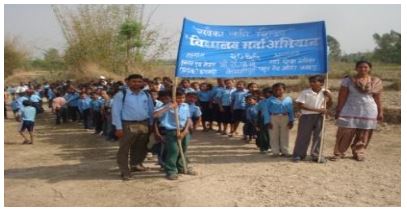
Advocacy/Campaign/Lobbying : DSS uses advocacy and campaign as tools to influence the policies at the village, district and national level. DSS has been successful in changing the attitude of public service providers both at the local and the district level. Community action is a key tool in pressurizing the bureaucracies and stakeholders and DSS facilitate communities for the same.
Moreover, it conducts interaction programs among public service providers that include village and district government officials, police officers, local leaders, civil society organizations and media.
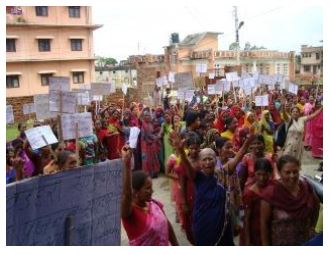
Water, sanitation and Hygiene : DSS has been working in the sector for the past fifteen years. It partnered with GPUK (Nepal) initially and is a partner of RWSSFD in delivering water, sanitation and hygiene services to community.
DSS has built 16 gravity system, 21 ground water system (dug-well), 3 overhead tanks, 15 ferocement tanks, 5 masson tanks, 40 mark three pump fitting and over 1000 water shield latrines thus far. It has served 2113 households and 10,565 are direct beneficiary of DSS drinking water, sanitation and hygiene interventions.
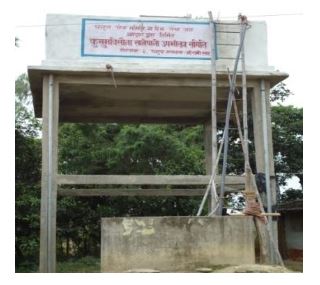
Irrigation and Income - generation : With support from District land Conservation Office (GoN) and Soil Conservation and water -shed program (GTZ), DSS has constructed 2.5 km. long traditional canal that irrigates more than 400 hectares of dry land to cultivate seasonal and off-Season vegetables and crops round the year. Ponds Constructed for water collection are being used for fish farming and irrigation vegetables Cultivation.
Environment & Sustainable Agriculture : DSS has provided practical training to local farmer in soil improvement and fodder development and also on how to use earthworms to prepare manure. DSS in collaboration with Department of Plant Resource District Office/GoN distributed 2,000 Vetivaria, 500 Rouwolia and 15 Sugandha kokil to SCG members, who were also given orientation / training on diverse aspects of herbs cultivation. Similarly, 1,688 fuel wood and fodder trees and 1,416 fruits were planted. Livestock development services related to 248 treatments, 2,374 immunizations, 24 Laboratory test and 48 Castration were conducted.